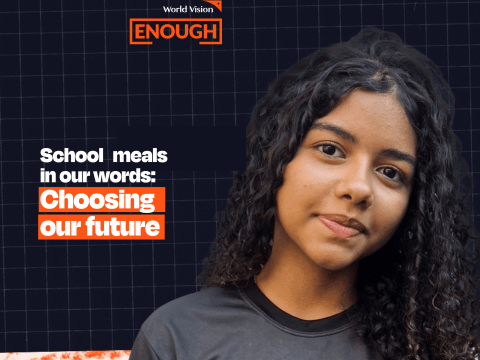Children Speak Out: School Meals Are More Than Food

Press Release. - London/Geneva 18 September 2025. A new child-led study by global relief, development, and advocacy organisation World Vision, involving 1,235 children aged 3–18, lays bare the lived reality of school meals through the eyes of those who know them best, children themselves. Conducted by young researchers from urban Brazil to rural Zimbabwe, the findings are striking; for children, school meals are the difference between learning and dropping out, between dignity and exclusion, between hunger and hope. Yet millions remain without them.
Children spoke loudly and clearly:
59% rated their meals positively, yet 38% expressed dissatisfaction.
In Rwanda and Zambia, meals kept children in school and reduced dropout rates.
In Zimbabwe, children described the devastating impact of inconsistent or inadequate food provision: hunger, fatigue, and exclusion from learning.
Most children reported that they were rarely, if ever, consulted about what they eat.
The Report “School meals in our words: Choosing our future” also reveals what works. Across all contexts, between 70% and 95% of children said meals helped them focus. In Cambodia and Peru, safe, nutritious school meals improved concentration in class, reduced household food costs, and kept more children in school. In Malawi, fortified porridge boosted attendance. Across all contexts, between 70% and 95% of children said meals helped them focus. And the benefits stretched far beyond the classroom: in Indonesia and the Dominican Republic, children linked school meals to reduced family stress and a deeper sense of being cared for at school.
For Karla, a 13-year-old from the Dominican Republic, being listened to is more than just a right, it’s a recognition of her everyday reality. She shares simply, “School meals guarantee at least one meal a day. They help families like mine.”
The numbers confirm her words. Every US$1 invested in school meals yields between US$3 and US$9 in social and economic returns. Some studies point to as much as US$35 in aggregated benefits across sectors. Few interventions deliver such extraordinary value.
“School meals are far more than a plate of food, they are a powerful, proven investment in human potential, national economies, and social equity. This is not merely a nutritional issue; it is about dignity, fairness, and education. And the best people to tell us how to get them right are the children themselves,” Lisa O’Shea, World Vision International’s Senior Director of Child-led and Digital Advocacy, Advocacy & External Engagement
Despite this evidence, external funding is shrinking. Gains made in fragile and humanitarian contexts are at serious risk of unravelling. 2.3 billion people now facing moderate or severe food insecurity. In Africa alone, hunger affects more than 307 million people, roughly one in five. These are not numbers on a spreadsheet, they are mothers skipping meals so their children can eat and teenagers leaving school to find work.
This research study is part of World Vision’s ENOUGH campaign, which calls for an end to child hunger and malnutrition worldwide and will be presented at the 2025 Global School Meals Summit in Brazil a pivotal moment to secure bold, lasting commitments to guarantee nutritious school meals for every child, everywhere, by 2030. World Vision’s call could not be clearer: leaders must act now. School meals are a strategic investment in human capital, national development, and, above all, children’s futures.
“To governments, donors, and development partners, the message is plain: what is needed now is bold, unapologetic action. Failure to act is not just negligent, it is unforgivable.” O’Shea added.
ENDS-
To learn more about the Global Child-Led School Meals Report Click here
For media interviews contact:
Karla Harvey, Sr Advisor of Impact Comms & External Engagement
Email: karla.harvey@wvi.org